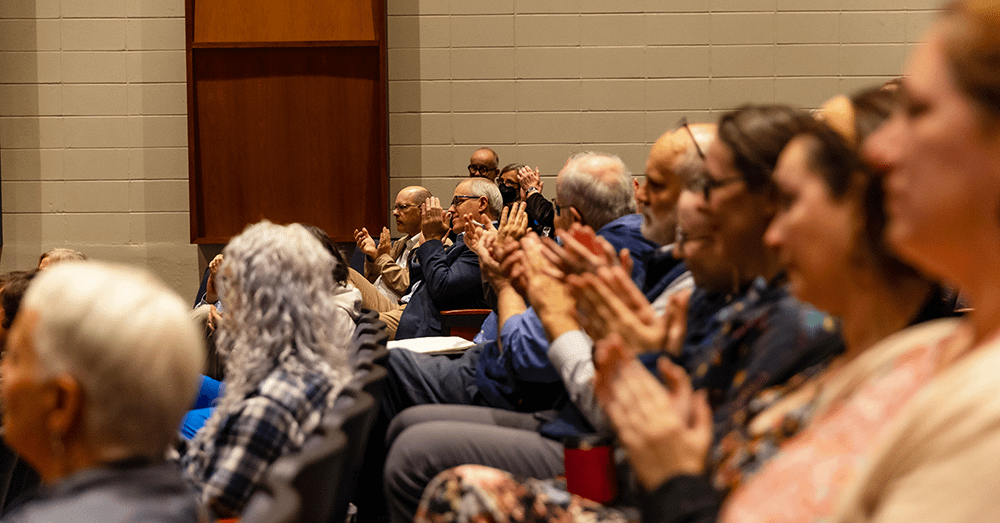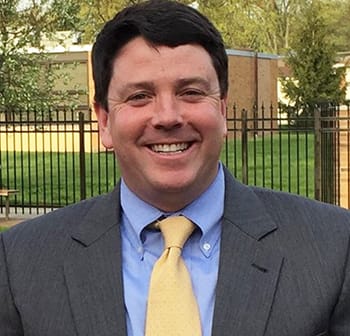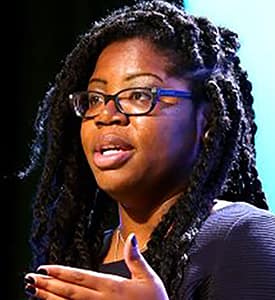Sutherland lecturer Richard Blanco explores poetry, identity, ‘home’
Historic Inaugural poet for President Obama reads his poems, tells about life growing up as Cuban-American, and champions importance of humanities in civic life
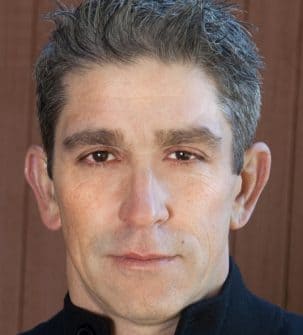
Richard Blanco
For this year’s annual Sutherland Lecture at Saint Michael’s College, Richard Blanco, the historic inaugural poet for President Barack Obama, shared his poems and personal story with nearly 90 viewers late Thursday afternoon, reflecting for about an hour via Zoom on his focusing ideas of “home,” country, identity and belonging.
Tara Natarajan, dean of the College and online host for the Zoom lecture, spoke up on the Zoom after the speaker’s final thoughts about the central importance of humanities in a democracy (as articulated in his new book How to Love a Country), speaking for many in the audience: “Richard, thank you for that meditation – that was captivating and brilliant.”
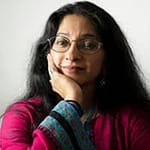
Tara Natarajan
Natarajan, who grew up in India, said that for her, “you’ve helped me think of my home for the first time in English” given a depth of poetic emotion that she was pleasantly surprised to experience. Blanco responded, “The life cycle of a poem is not complete until it lives in this way – it’s a gift one gets and passes on.”
To start his lecture, the amiable and articulately precise Blanco told of growing up in a Cuban-American immigrant family in Miami, being guided to become an engineer, and finding his way inexorably to poetry in due time, since he continually felt absorbed by his need to express, through his words that he discovered a gift for — his identity: that is, what did it mean to be an American, a Cuban-American, a gay man … and where was his literal and spiritual “home”?
The Sutherland lecture is one of two endowed lectures at the College. Family members of the lecture’s namesake, the late Donald Sutherland – Paige and Denise Sutherland – both were in the audience, as were Saint Michael’s President Lorraine Sterritt, Trustees chair Pat Casey, and Jeff Trumbower, vice president for academic affairs.
Blanco said in his mind, “every poet and artist is sort of writing one poem all their lives” – and for him, a central obsession about the meaning of “home” took root for him at an early age, becoming something he has tried to work out his entire life. He told of his first creative writing class assignment in a class as a young man to “write a poem about America”’ – he then proceeded to read for his Thursday audience that poem, which used vivid images about everything from food to amusing cultural clashes between Cuban and American family norms and everyday things – for instance, having pork instead of turkey on Thanksgiving for his family.
He talked a lot about his mother and grandmother and their influences on his life, telling of his mother’s life in the U.S. after leaving everything she knew and loved behind in Cuba to seek a better life for her family — sewing for a living, riding the bus, learning English with him. His grandmother was unabashedly homophobic, reflecting the macho culture from which she came, he said, but in her own way, showed him support and love – as if she just wanted to protect him from pain.
Blanco spoke of places that meant so much to him and why – Miami his childhood home, but also a motel that was a modest working-class family’s vacation destination on Florida’s Gulf coast Marco Island, which to him felt for years like a sort of ideal to him, though he experienced in his life, eventually, the idea that “you can never go home” – at least to physical places that invariably change so much. Other places he has lived include Hartford, CT, Brazil, Guatemala, returning to Florida and ending up in Maine.
The speaker also told how being a civil engineer took on a human element that connected him to poetry – “realizing somebody’s son is going to learn to ride a bike in that park I’m helping to design, or somebody will have their first kiss by a bench in that park – it humanized what I did as an engineer… and I realized we’re all together in many ways.”
Blanco also stressed how he wants to champion humanities “and how important they are in anything we do in life” – a welcome message for this Sutherland Lecture audience. “For you English teachers out there, always try to tell students, if you’re a student in science or STEM fields, you’d better get your humanities in order, since they make us more aware individuals, which makes us better engineers, doctors…parents — I really believe in that,” Blanco said.
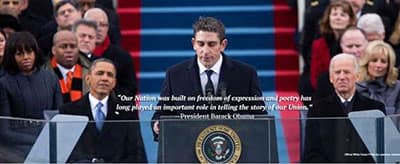
Richard Blanco reads his poetry at the Inauguration of President Barack Obama.
A highlight of the lecture near the end was when he read the poem he had written for the Obama Inauguration, setting the scene and describing how he got the invitation to “write a poem about America” – the same assignment, ironically, as in his first creative writing class — and his emotions surrounding that life-changing milestone in his life. The experience redirected his thinking by forcing him to ask such questions as “Do I even love this country, what does it really mean to me, and does it love me back – am I part of this narrative as an immigrant, gay, working class kid – so my poem is a response to those questions in the affirmative. I AM part of this narrative.” He then engaged in a lively question and answer session for nearly half an hour.
He said asking those questions for the Obama Inauguration got him thinking more of the civic role of a poet in society and the need “to put questions on the table we’re not asking” through art and civic discourse —the idea of interweaving humanities and service – or, as Blanco put it — “what do we do with all this stuff that we learn, how to we put it into action?”
The widow of lecture namesake Donald Sutherland said afterward in a note to the Dean’s Office, “His sense of humanity, the frailty and dreams of mankind, was inspiring. I found his voice to be so refreshing in today’s world of anger and division. Thank you for inviting him for the Sutherland Lecture. Don was a huge believer in the importance of the liberal arts, and I know he would have enjoyed Mr. Blanco’s poems.”


